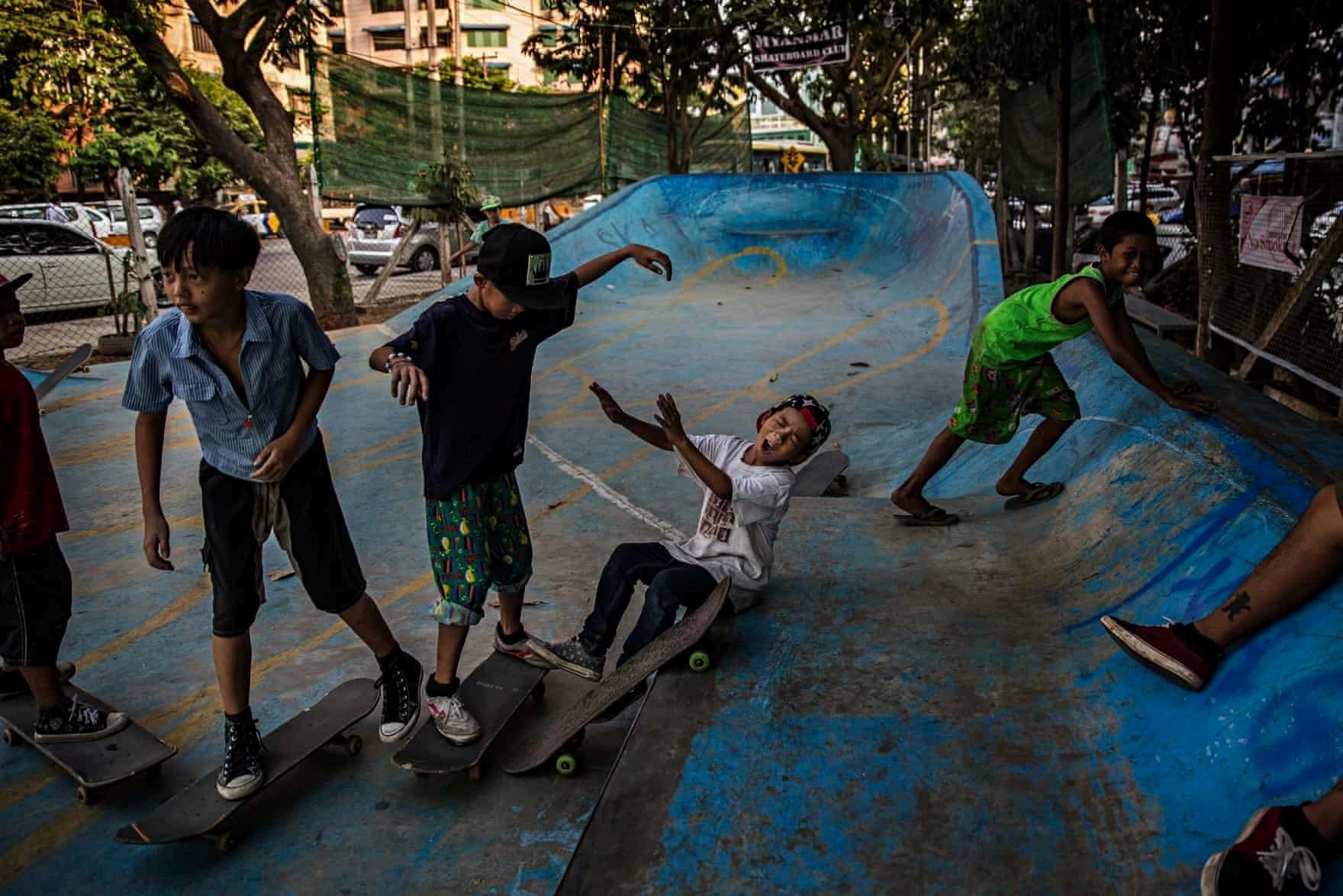
On first seeing the intricate kickflips and drops, Waso doubted himself—skateboarding would be too difficult, he thought. “But it felt great when I mastered it,” said the 15-year-old, sitting on a ramp amid the grind of wheels at Mya Lay Yone Skate Park, where he has practiced since the park was built five years ago.
For him, skateboarding has become a daily routine, a getaway from the slums of the Sin Ma Lite neighborhood in Kamayut township, and, through a community initiative, has even improved his literacy and ensured his family have a roof over their heads.
Based in the same township, the park has become a hub for three generations of skateboarders, from six-year-olds to dab hand 40-somethings. Managed by non-profit skateboarding developer Pushing Myanmar, it boasts Myanmar’s first professional course, complete with curved walls, street obstacles and flashy graffiti art.
Young people like Waso have joined Pushing Myanmar’s loaner board programme, which lends skateboards and protective gear for free. The children have also learned life skills and literacy after the team noticed that most of them could not afford the uniform or stationery for school, and so stayed out of the classroom. In the case of Waso and another teenager, Pushing Myanmar has organised donations from the international skateboarding community to provide food and rent for their families during the Covid-19 pandemic.
Start of a scene
“They’re so young that they’re fearless, and they take to skateboarding very well,” said Ali Drummond, 32, producer of skateboarding documentary Youth of Yangon and the leading organiser for Pushing Myanmar. “Many of the children who started skating right after the park was built are now extremely skilled. We also have people to supervise them, so their parents are fine with them spending time here.”
Although the skateboarders miss out on school, said Drummond, the park offers a safe environment for them to build confidence and communication skills.
“Since their parents are struggling and they don’t get much emotional support, learning complicated tricks can really help them realize that they can achieve things by putting their mind to it,” he said. “The great thing about skateboarding is that there’s no discrimination based on age, gender, social status or religion. Everyone’s getting on through skateboarding.”
Youth of Yangon, created with director James Holman in 2013, followed the challenges faced by the city’s small but tight-knit skateboarding community. It was Holman’s second documentary about skateboarding in Myanmar—his first, Altered Focus, put an international spotlight on the local scene in 2009, drawing the attention of Make Life Skate Life, a non-profit organization that builds skateparks in developing countries. Through crowdfunding and the help of volunteers, the non-profit built the 4,300-sq-ft cement park in Yangon, marking a huge development for local skateboarders. While skateboarding has been around in Myanmar since the 1980s, the scene remained largely stagnant due to the lack of parks, government support and access to high-quality skateboards. Skateboarders could not make the jump from recreation to competitive sport.
Skating for everyone
With the arrival of the park, and the guidance of the Myanmar Skate Association and Pushing Myanmar, skateboarders participated in the SEA Games 2019 in the Philippines—the first time the sport was officially contested in the regional games.
“Competing in the SEA Games and representing our country was a heavy responsibility,” said Pius Peru, 26, one of the three skateboarders to represent Myanmar. “I really put my mind to it and trained intensely.”
The owner of skate brand Pius, which often sponsors Myanmar skateboarders, Peru has been skating for more than a decade. It’s a rocky career in most places, but especially Myanmar, he said, not only because of inadequate funding but also because of criticism from some members of the public who see skateboarders as a nuisance.
Pursuit of the sport is limited mostly to those who can rely on wealthy families or sponsors, meaning that in Myanmar, professional skateboarding has become a preserve of the middle and upper classes.
Peru has tried to counter this exclusion by running free skateboarding classes. “The skating community feels like an extended family,” he said.
While the skate park has closed and reopened several times during the pandemic, skateboarders have been exploring their options and honing their skills in their own neighbourhoods. Crucially, the temporary closure of the park has not spelt the end for the support of young skateboarders. Pushing Myanmar’s financial help has granted Waso some tranquility, perhaps even more than the sport itself.
“My mother was really anxious that we wouldn’t have a place to stay,” he said. “So it makes me happy to see her less worried.”

